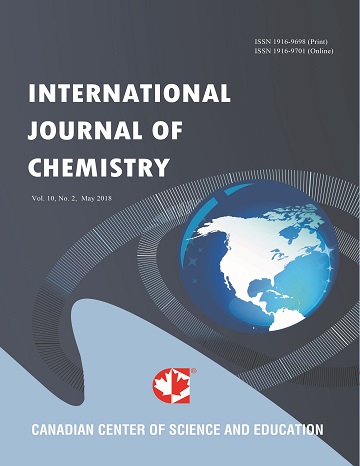Indirect Iodination on the Vinyl Double Bond of Andrographolide
- Jutti Levita
- Ni Made Widiastuti
- Ilma Nugrahani
- Amir Musadad
- As'ari Nawawi
- Abdul Mutalib
- Slamet Ibrahim
Abstract
Andrographolide is a bicyclic diterpenoid constituent of Andrographis paniculata which is used extensively in the traditional medicine in Indonesia to treat inflammations. The structure of andrographolide contains an a-alkylidene r-butyrolactone moiety, two olefin bonds at C-8(C-17) and C-12(C-13), and three hydroxyls at C-3, C-19 and C-14. Andrographolide's structure lacks of aromatic ring, hence the iodination reaction of this compound is quite an interesting challenge to be investigated. Iodine atom was incorporated at vinyl position by indirect reaction. The reaction was divided into two steps, which was started by a bromination in non polar medium, then followed by iodination. It is shown that the principal reaction is the addition of bromine atom to an sp2 carbon atom of the vinyl group via electrophilic substitution. Bromination was carried out in chloroform solvent at room temperature to produce bromo-andrographolide. The iodination was applied further by using palladium triphenylphosphine catalyst. Positive charge iodine species was produced in situ with the addition of chloramine-T, an oxidizing agent, at 40 oC. 1H-NMR study shows that iodine attacked the C-12(C-13) vinyl bond which was confirmed by (1) the disappearance of proton chemical shift of C-12 at SH 6.86 ppm and (2) the change of proton chemical shifts of C-11 which shifted downfield at SH 2.74 ppm and 2.63 ppm, due to the deshielding effect of iodine.
- Full Text:
 PDF
PDF
- DOI:10.5539/ijc.v3n4p47
Index
Contact
- Albert JohnEditorial Assistant
- ijc@ccsenet.org
